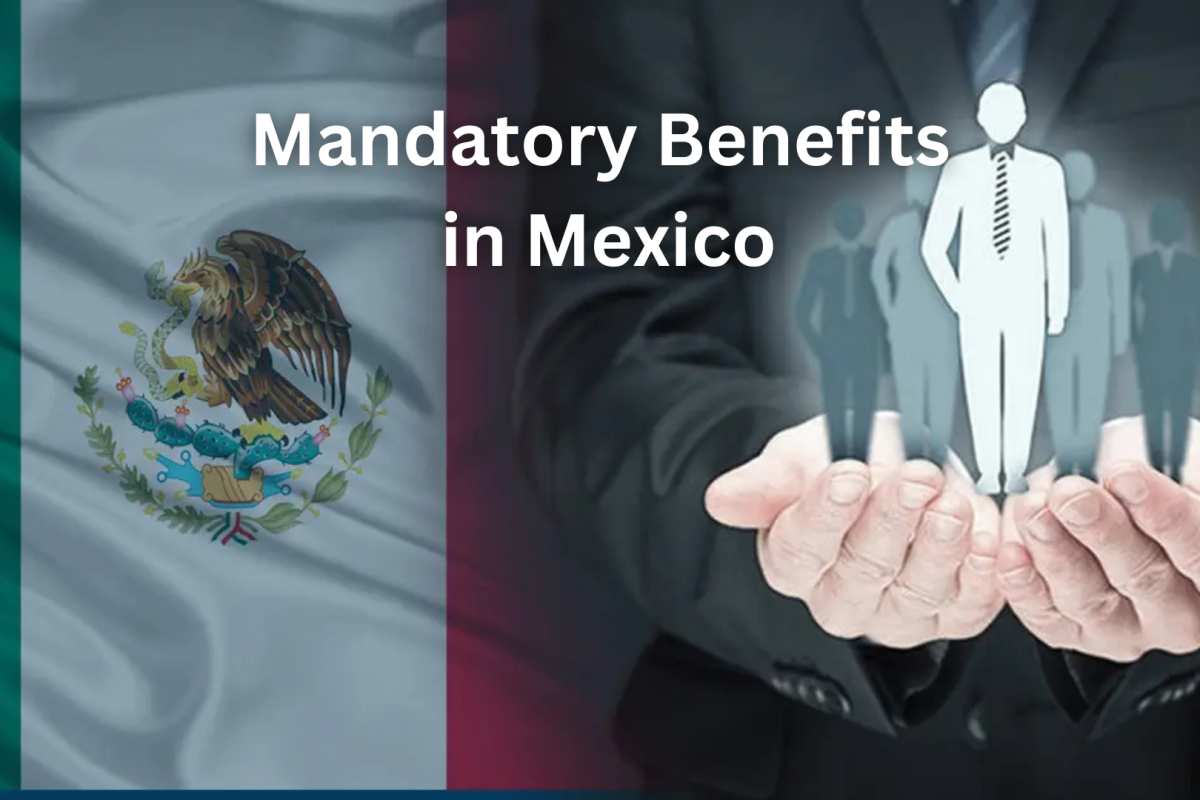Mexico mandates a series of statutory benefits that employers are required to provide to employees. Understanding these benefits is crucial for businesses operating in Mexico, particularly when using Employer of Record (EOR) or Professional Employer Organization (PEO) services. These benefits ensure workers’ welfare and promote compliance with local labor laws, helping businesses foster strong employee relations.
Key Mandatory Benefits in Mexico
Mexico offers a range of mandatory benefits to ensure the well-being and security of employees. These typically include social security contributions, insurance, and statutory leave. Here’s an overview of the key benefits every employer must provide in Mexico.
1. Social Security (IMSS)
-
Description: The Mexican Social Security Institute (IMSS) provides healthcare, pensions, and social insurance coverage to employees. Employers must register their employees and contribute to the IMSS.
-
Employer Contribution: Typically 15-20% of the employee’s salary, covering health insurance, retirement savings, and risk premiums.
-
Employee Contribution: Approximately 2-5% of their salary.
2. Retirement Savings (Afore)
-
Description: Afore accounts are individual retirement savings managed by private pension fund administrators. Contributions are required to ensure income for employees upon retirement.
-
Employer Contribution: 5.15% of the employee’s salary.
-
Employee Contribution: 1.125% of their salary.
-
Government Contribution: The government also contributes a small percentage to these accounts.
3. Mandatory Christmas Bonus (Aguinaldo)
-
Description: The Aguinaldo is a mandatory year-end bonus paid to employees to help cover expenses during the holiday season. It is calculated based on the number of days worked in the year.
-
Employer Requirement: The equivalent of at least 15 days of salary, to be paid by December 20th each year.
-
Employee Contribution: No contribution required.
4. Profit Sharing (PTU)
-
Description: Mexican law mandates that companies share a percentage of their profits with employees. This benefit is typically distributed once per year.
-
Employer Contribution: Companies must allocate 10% of their annual pre-tax profits to eligible employees.
-
Employee Eligibility: Employees who have worked for the company for at least 60 days are eligible.
5. Vacation Days and Vacation Premium
-
Description: Employees in Mexico are entitled to paid vacation days after one year of service, with the number of days increasing based on tenure.
-
Employer Contribution: Employees must be provided with at least 6 days of paid vacation after the first year of service, increasing by 2 days every additional year, and a vacation premium equal to 25% of their daily wage for each day of vacation taken.
-
Employee Contribution: No contribution required.
6. Maternity and Paternity Leave
-
Description: Maternity leave provides paid time off for female employees during pregnancy and recovery. Paternity leave is also offered for new fathers.
-
Employer Contribution: Employers are required to cover maternity leave for 12 weeks (6 weeks before and after childbirth), with pay covered by IMSS. Fathers are entitled to 5 days of paid paternity leave.
-
Employee Contribution: No contribution required.
7. Work-Related Risk Insurance
-
Description: This insurance protects employees in case of work-related injuries or illnesses. Coverage includes medical expenses, disability compensation, and pensions.
-
Employer Contribution: Contribution rates depend on the risk level of the industry but generally range from 0.5-7% of the employee’s salary.
-
Employee Contribution: No contribution required.
8. Unemployment and Severance
-
Description: There is no unemployment insurance in Mexico. However, in case of termination without just cause, employees are entitled to severance pay.
-
Employer Obligation: Severance payments typically include 3 months of salary, 20 days of salary per year worked, and other accrued benefits.
-
Employee Contribution: No contribution required.
Additional Benefits and Considerations
Statutory Leave and Public Holidays
-
Annual Leave: After one year of service, employees are entitled to 6 days of paid annual leave. This increases by 2 days every year up to 12 days, with further increases based on tenure.
-
Public Holidays: Mexico has 7-8 official public holidays, such as Independence Day (September 16) and Constitution Day (first Monday in February).
Sick Leave and Maternity Leave
-
Sick Leave: Employees are entitled to paid sick leave, with IMSS covering a percentage of the employee’s salary after the third day of illness.
-
Maternity Leave: Female employees receive 12 weeks of paid maternity leave (6 weeks before and 6 weeks after childbirth), with coverage from IMSS.
Understanding Mandatory Benefits for Employers
Compliance with Local Regulations
Mexico’s mandatory benefits system is highly regulated, and companies must stay compliant with both federal and state labor laws. Understanding the contributions and benefits is crucial to ensuring that employees are well taken care of and that your business avoids any penalties.
Managing Benefits with EOR/PEO Services
Employers without a Presence in Mexico: Utilizing Employer of Record (EOR) or Professional Employer Organization (PEO) services like GlobainePEO can simplify managing these benefits. EOR/PEO services handle the complexities of compliance, allowing companies to focus on their core operations.
Employers with a Mexican Entity: Companies with a local entity must handle social security, taxes, and employee benefits directly. EOR/PEO services can still assist in navigating regulatory changes and handling HR administration.
Additional Considerations for Global Employers
-
Changing Rates: Contributions to social security and other benefits may change based on government regulations, so employers need to stay updated.
-
Caps on Contributions: There are caps on some contributions, such as social security, which are calculated based on the employee’s salary.
Final Thoughts
Understanding and providing mandatory benefits in Mexico is critical to maintaining compliance and ensuring employee satisfaction. Employers, especially those leveraging EOR/PEO services like GlobainePEO, should stay updated on local laws to avoid penalties and foster a positive work environment.
GlobainePEO – Your Trusted Partner
At GlobainePEO, we help employers navigate the complexities of managing mandatory benefits in Mexico. From ensuring compliance with local labor laws to managing payroll and contributions, we provide the support your business needs to thrive. Let us handle your workforce management while you focus on growing your business.

